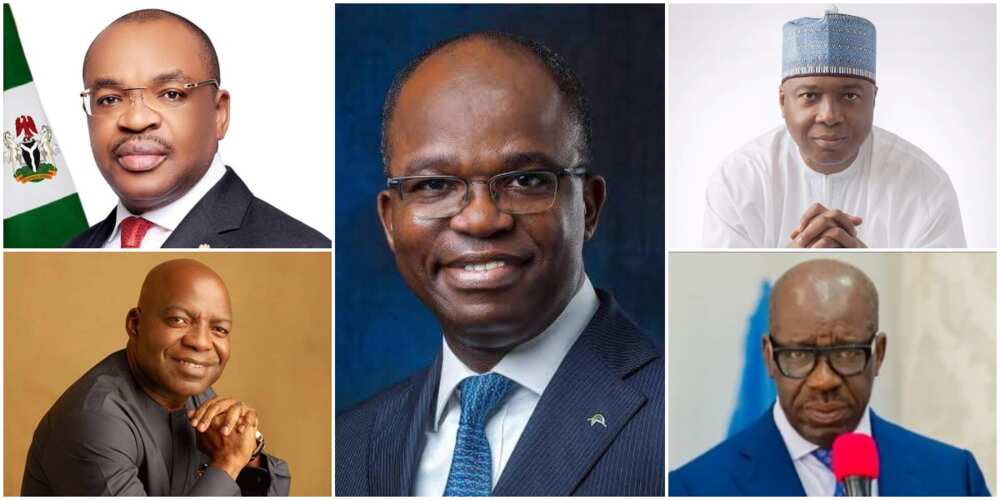Bank Job or Politics Money: Five Nigerian Bankers Who Quit High Paying Job to Become Governors, Senators
- Private sector bosses have been trooping into the corridor of power, and several of them have come from the financial industry of Nigeria
- The likes of Alex Otti, Tokunbo Abiru, Godwin Obaseki, Udom Emmanuel and Bukola Saraki all worked for more than ten years in the banking sector
- Financial institutions like Zenith Bank, First Bank, the default Diamond Bank and Société Générale Bank (Nig) Limited have provided Governors and Senators
What will it take to make you quit a top paying bank job to chase a political career filled with uncertainty - does the offer of lawmaker or governor's seat sound good to your ears?
As you think about it, there are some individuals that have already taken the risk to abandon their high paying bank job to work in Nigeria's corridor of power.
Alex Otti
He started his banking trainee programme in 1988, working for Citibank of New York's subsidiary, Nigerian International Bank. Otti spent 25 years in the banking industry.

Source: Facebook
Before he rose to head First Bank of Nigeria and Diamond Bank, Otti had worked for Nigerian Intercontinental Merchant Bank Ltd and Societe Bancaire Nigeria Limited.
His portfolio also included United Bank of Africa. However, in October 2014, he retired from Diamond Bank to join politics, contesting for the governorship election of Abia State on the back of All Progressives Grand Alliance party.
He lost the election to Okezie Ikpeazu of the Peoples Democratic Party, but Appeal Court replaced Ikpeazu with Otti after a court hearing in 2015.
The decision was contested at the Supreme Court, and Ikpeazu was restored the next year. Otti now serves as a member of This Day's (newspaper) Editorial Board.
Tokunbo Abiru
Abiru has been in and out of private and public sector, almost as if he couldn't bring himself to commit to one of the sector - but who will blame him, politics and banking have appealing incentives.
The investment banker has over 26 years experience in the banking sector, serving various financial institutions within these periods - some of them being FBN Quest Merchant Bank Limited, FBN Bank Sierra-Leone Limited.
Others are Nigeria Inter-Bank Settlement System Plc and Airtel Mobile Networks Limited. He left the banking system in 2011 to serve as commissioner for finance under former govnor of Lagos state, Babatunde Fashola.
But he was pulled back into the banking sector by the Central Bank of Nigeria to head the restructuring of Skye Bank, which later became Polaris Bank.
But he resigned his position in August 2020 to contest the Lagos East senatorial election as a candidate of All Progressives Congress. In the By-Election in December same year, Abiru was declared winner.
Udom Emmanuel
With over seventeen years experience in Nigeria's banking system, Emmanuel is a name worth mentioning, as he quit his lucrative job at Zenith Bank to become a Secretary to the State Government in Akwa Ibom State.
He made the switch during Godswill Akpabio's tenure as Akwa Ibom governor. But before he left banking, he worked for Diamond Bank and spent most of his banking career at Zenith Bank, where he rose to Executive Director.
Emmanuel's switch paid off later, as he became the governor of Akwa Ibom in 2015 under the umbrella of People's Democratic. He is currently an incumbent.
Bukola Saraki
Compared to the aforementioned names, Bukola Saraki is the most notable considering he obtained Bachelor of Medicine, Bachelor of Surgery from London Hospital Medical College of the University of London.
But he still found his way into Nigerian banking sector, where he led Société Générale Bank (Nig) Limited (for ten years) four years after graduating and one year after working as medical officer at Rush Green Hospital, Essex.
Former President Olusegun Obasanjo pulled him out of the financial system in 2000 to become his Special Assistant on Budget. Three years, Saraki was elected Governor of Kwara State on the back of People's Democratic Party.
After two terms, he became a Senator in 2011, and rose to the position of President of the Senate four years later - Saraki's senatorial career was however cut in 2019.
Godwin Obaseki
He started his career with Capital Trust Brokers Limited in Lagos, 1983, after obtaining degrees in Finance and International Business.
Obaseki made an inroad into the banking sector after pitching tent with International Merchant Bank, before joining AVC Funds Limited as a Project Manager.
His portfolio includes Equatorial Finance Company, where he served as the head of the Financial Advisory firm. He later went on to establish his own investment company, Afrinvest West Africa Limited, in 1995.
Obaseki exited his position as chairman in September 2016, to join politics, contesting as for the governorship seat in Edo State - he won the election as All Progressives Congress member, and was re-elected after contesting on the ticket of People's Democratic Party.
Billionaires who were school dropouts
Legit.ng had previously reported that some billionaires on the wealthiest people list are school dropouts who abandoned their desire to obtain a degree to start a business.
The likes of Richard Branson, Travis Kalanick, and more quit school at an early age between 16 years to 22 years to setup companies that have become global brand.
Over the years, these billionaires have shown that degree certificate is not a criteria to success.
Source: Legit.ng





